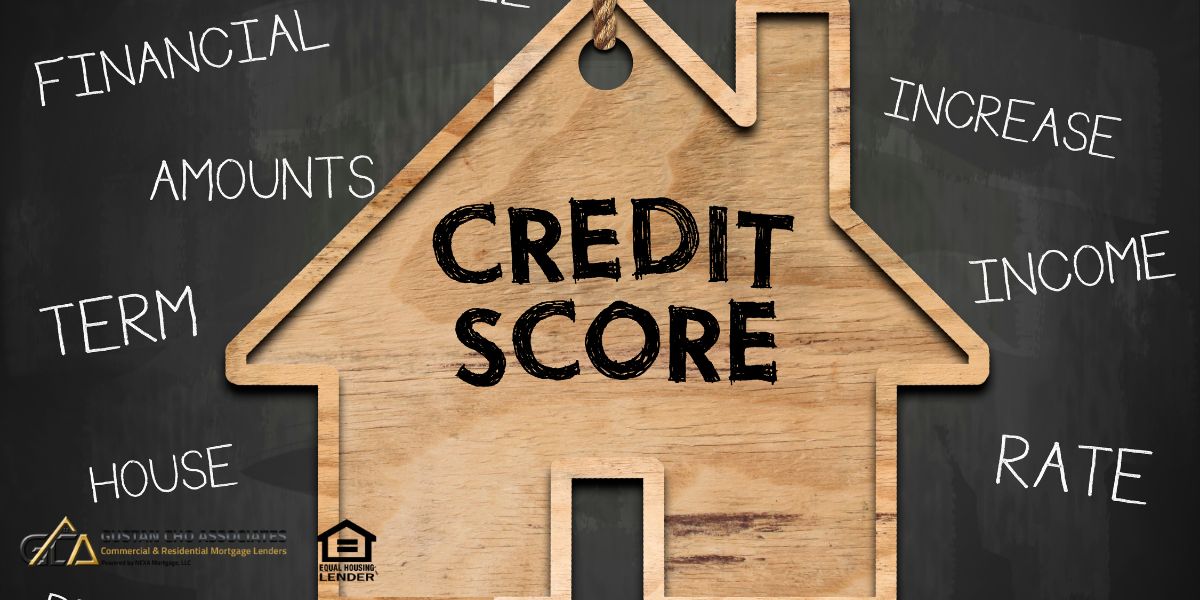This guide covers credit scores and mortgage rates versus pricing adjustments. Credit scores and mortgage rates go side by side. The most important factor in any mortgage loan application process is one’s credit score. Although income, credit, credit history, debts, assets, and liabilities are all important in the mortgage loan application process, the single most important factor in a mortgage loan application process is a borrower’s credit scores next to qualified income. In the following paragraphs, we will cover credit scores and mortgage rates versus loan-level pricing adjustments.
Correlation Between Credit Scores and Mortgage Rates
Credit scores significantly impact mortgage rates and pricing adjustments. Here’s how they interact: Higher Credit Scores Lead to Lower Rates: Borrowers with higher credit scores generally qualify for lower mortgage rates. Lenders view these borrowers as less risky and offer them more favorable terms. Lower Scores Mean Higher Rates: Conversely, lower credit scores can lead to higher interest rates. Lenders charge more to offset the perceived higher risk of default.
Pricing Adjustments Based on Credit Scores
Loan-Level Price Adjustments (LLPAs): Lenders use LLPAs to adjust the pricing of a mortgage based on risk factors, including the borrower’s credit score. These adjustments can affect the overall cost of the loan. Impact on Loan Cost: For example, a borrower with a credit score below 620 might see significant LLPAs, increasing the cost of borrowing. As the credit score improves, these adjustments decrease.
Factors Influencing Pricing Adjustments
Down Payment: A larger down payment might reduce the impact of a lower credit score because it decreases the loan-to-value ratio, lowering the lender’s risk. Loan Type: Different types of loans, such as FHA or conventional, have different pricing adjustments based on credit scores.
Strategies for Borrowers
Improving Credit Scores: Borrowers should improve their credit scores before applying for a mortgage. This can be done by paying bills on time, reducing debt levels, and correcting any inaccuracies on credit reports.
Shopping Around: Borrowers must shop around and compare offers from multiple lenders to find the best rate and terms for which they can qualify.
Understanding the relationship between credit scores and mortgage pricing is crucial for managing the long-term costs of a mortgage. Better credit not only provides lower interest rates but also improves the terms and conditions of loan offers. By strategically managing their credit health, prospective homeowners can significantly influence the affordability and cost of their home loans. Qualify for a mortgage loan with low credit scores
How Credit Scores and Mortgage Rates Determines Whether You Qualify For a Loan Program
Credit scores are the deciding factor in what credit tier a borrower qualifies for. For example, to qualify for an FHA loan, you need a minimum credit score of 500 FICO. For those borrowers with credit scores between 500 and 579 FICO, they need a minimum 10% down payment in order to qualify for FHA Loans. Home Buyers who only want to put a 3.5% down payment on a home purchase, need a credit score of 580 FICO or higher. Borrowers with credit scores of 579 FICO would not qualify for a 3.5% down payment mortgage loan. They would only qualify for a 10% down payment FHA loan. That 1 point difference would require borrowers for the higher down payment.
What Are Minimum Credit Scores For a Conventional Loan?
Credit scores are critical for those who want to qualify for conventional mortgage loans. Most lenders have minimum credit scores required for conventional mortgage loan programs. The minimum credit scores required for most conventional mortgage loan programs for most mortgage lenders are 640 FICO. A 640 FICO credit score is considered poor for conventional mortgage loans. Most borrowers with credit scores of 640 FICO will probably get less than favorable mortgage rates.
Credit Scores and Mortgage Rates and Loan Programs
To qualify for a conventional mortgage loan requiring a 5% down payment, most mortgage lenders require credit scores of 640 FICO. To qualify for conventional loans requiring a minimum 3% down payment, most lenders require credit scores of 680 FICO or higher. To qualify for jumbo loans, most portfolio jumbo lenders require credit scores of 720 FICO or higher, while other lenders require credit scores of 740 FICO or higher. Condotel lenders require minimum credit scores of at least 680 FICO.
How Credit Scores Versus Lender Overlays Determine Getting Approved For a Mortgage

The minimum credit score required for an FHA mortgage loan is 500 FICO. However, most lenders have their own overlays. A lender’s overlay is the lender’s own lending criteria surpassing the minimum FHA guidelines. Just because you got an automated approval by Fannie Mae’s Automated Underwriting System does not mean that you are guaranteed a mortgage loan. The lender has its own lending criteria which are above and beyond Fannie Mae’s guidelines. For example, many lenders have their own FHA lending overlays when it comes to minimum credit scores. Although the minimum credit score FHA requires is 500 FICO, there are many lenders who set their credit scores overlays at a 640 FICO minimum.
Need To Monitor Credit Scores
Lower credit scores mean higher costs for mortgages, insurance, credit cards, and installment loans. Borrowers need to monitor your credit report regularly and see that there are no errors on their credit report. One late payment on a monthly revolving or installment account can drop credit scores by 80 points or more.
Home Loan With Low Credit Scores
As long as you can provide proof of income, you can get a mortgage loan as long as your credit scores are above 500 FICO and you get an automated approval by Fannie Mae’s Automated Underwriting System or via a manual underwrite. The team at Gustan Cho Associates specializes in helping folks with prior bad credit or lower credit scores and work with dozens of wholesale lenders who do not have overlays. Homebuyers have lower credit scores or have had prior credit problems, please contact me at 800-900-8569 or text us for a faster response. Or email us at gcho@gustancho.com. Or visit us at www.gustancho.com. I am confident I will be able to get you to get a residential mortgage loan approval. Get Approvable for a Home Loan with low credit scores
- Related> Improving Credit Scores To Qualify For Mortgage
- Related> FHA Guidelines On Minimum Credit Scores
- Related> How Can I Improve Low Credit Scores
FAQ: Credit Scores and Mortgage Rates versus Pricing Adjustments
- What is the main factor affecting mortgage loan applications? Your credit score is the most important factor when applying for a loan. Although income, credit history, debts, assets, and liabilities are significant, credit scores significantly impact your eligibility and loan terms.
- How do credit scores affect mortgage rates? Credit scores affect mortgage rates. Higher scores lead to lower rates, while lower scores lead to higher rates due to the perceived risk by lenders.
- What are Loan-Level Price Adjustments (LLPAs)? LLPAs are adjustments lenders make to mortgage pricing based on various risk factors, including the borrower’s credit score. For example, a borrower with a credit score below 620 might face significant LLPAs, increasing the overall cost of the loan.
- How can a larger down payment influence the impact of credit scores on loan terms? A larger down payment might mitigate the negative impact of a lower credit score on loan terms because it decreases the loan-to-value ratio, which lowers the lender’s risk.
- What strategies can borrowers use to improve their mortgage conditions? If you want to increase your chances of getting a loan, improving your credit score is important. You can do this by paying your bills on time, reducing your debt, and checking the accuracy of your credit reports. It’s also a good idea to compare offers from different lenders to get better rates and terms. Remember to review and adjust regularly to stay on track.
- What are the minimum credit score requirements for different types of loans? Knowing the minimum credit score requirements is important to secure a loan. A credit score of at least 500 FICO is required for an FHA loan; for a conventional loan, the minimum FICO score is 640. However, aim for a higher score to improve your chances of securing favorable loan terms.
- How do lender overlays affect loan approval? Lender overlays are additional criteria lenders impose above the minimum guidelines. For example, while the FHA requires a minimum score of 500 FICO, many lenders may set their minimum at 640 FICO. Even if a borrower meets FHA’s standards, they might not qualify under a lender’s overlays.
- Why is it important to monitor credit scores regularly? Monitoring credit scores is crucial because a drop can significantly increase the costs of mortgages, insurance, credit cards, and other financial products. Regular monitoring helps ensure no errors and allows individuals to manage their credit health effectively.
- Can you get a mortgage with a low credit score? Yes, as long as your credit score is above 500 FICO and you meet other lending criteria, such as proof of income and an automated approval from Fannie Mae’s system or a manual underwrite, you can secure a mortgage. Organizations like Gustan Cho Associates specialize in assisting those with lower credit scores.
- How can improving credit scores help in qualifying for a mortgage? Work on improving your credit score. You can secure better loan terms, lower interest rates, and more affordable home loans. You may access a wider range of loan programs with better benefits if you have a higher credit score.








